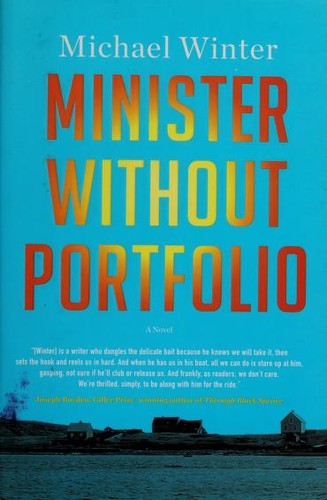JohnnyCache reviewed Minister without portfolio by Winter, Michael
Review of 'Minister without portfolio' on 'Goodreads'
1 star
[I updated my review after some discussion with a book group. See [EDIT] at the bottom for addition.]
Please note that this isn't a review so much as some of my notes from an email-based discussion of the book. If you are going to get offended by somebody who didn't like a book that you loved, please do not continue reading this.
Yet again, I'm the guy who doesn't "get" the book that everybody else seems to like.
Maybe I was just ecstatic because my ereader said that there was only 12 minutes left before the book was done (thank goodness), but I finally found two things that I really liked about the book. Two sentences, actually. Out of the whole damn book, two sentences.
1. referring to the "fiercely closed eyes" of a newborn baby. I like the description.
2. after the baby was born, "They both felt it astonishing that they were being allowed to take this infant away from the machinery of the world and become responsible". I thought that he captured my feelings perfectly, especially as we were leaving the hospital with a child of my own. It really seemed like they were letting us loose with no idea of how to take care of a new, completely vulnerable human being. Which is exactly what was happening, but he described the feeling in a single line.
Okay, I just finished the epilogue. I really liked this part:
"He walked over to the other door and opened it and unclicked his daughter and she reached up to his neck and tugged herself out of the car seat. He called to her. Tender, Tender. Even though this was not her name and not one of the dozen names they both called her. It was his private word, not to name her, but for her to ave a memory of the name - a happiness as she held on to the neck of this man raising her." Why wasn't the rest of the book like this?
Overall, I really disliked the book. I didn't care for the characters, the storyline (if there was much of one), and even the strange narrative way that it was written - my favorite part of the whole damn thing - started to annoy me halfway through when I had no idea who was talking at any given moment. Maybe there's a reason why authors have generally accepted standard narrative formats throughout the centuries.
However, somebody who is smarter than me with books would probably be able to pick out a ton of interesting bits and pieces throughout this book. I am sure that the beaver was supposed to be symbolic, although I've got no idea what for (and it was the most blatantly obvious of the bunch). There must be others. Unfortunately for the author, I have zero interest in going online and finding out more. I'm happy to chalk this up to a sub-par experience and walk away. The last time I had such a lack of interest in a book was when I attempted to read "the Golem and the Jinni" and "The Luminaries". Both books won a billion awards, so I'm obviously swimming against the stream on them, but they just weren't compatible with my tastes.
If I was even slightly interested in the book, I'd flip back to the beginning and try to clarify how long the guy spent in Afghanistan. I was under the impression that it was for a single contract, maybe 2 or 3 months, 6 at the most, but the whole book refers to these memories he had of Afghanistan. Maybe that was it, and might make the book far more interesting than I think it is... if he actually spent a relatively short time there, but it was so traumatic and powerful that he kept making these psychological and emotional links to the country for months and years after. I think that I've had a similar experience, where I spent a few months away from home the first time and I still keep recounting the memories from that short period, artificially exaggerating the effect that it could realistically have had on me.
Does anybody think that the narrator had a screw loose? Did he completely make up the scenario at the end where he was sure that those guys had a plan to torch the house and possibly kill the guy who was there? Did the incinerator thing actually happen? I was so happy that the guy might die in there and the last hundred pages of the book might just be blank (no such luck), but now I'm wondering if the whole thing might be a PTSD fever dream.
[discussion shifts to the question of love - I removed the comments from the other party in the discussion]
I don't think that he felt any love in his relationship with the widow. I think that it was purely his sense of responsibility. He felt obligated to take care of her, Tender's house and the baby. The baby was the first time that he showed any emotion, but it was still focused on ensuring that the baby had some memory of Tender's name.
He was so irresponsible in the book (nearly drowning however many times, falling into an incinerator, setting the fire) that it seemed to me like a depressed guy who was just tempting death the whole time, even if it was endangering the people around him. By the way, falling into an incinerator - who does that??? Michael Winter actually did, back in 2006, and Johnny Cash described a similar situation in 1963.
Seems to me like the guy was just emotionally numb throughout the whole book, starting at (or before) his divorce with his wife and finally cracking when the child was born. I'm sure that's symbolic somehow.
Conclusion:
Not a terrible book, just I really had to search to find something I liked about it. Reading is, to me, supposed to be something enjoyable. I didn't enjoy this and would not have read it if it wasn't for Canada Reads and my book discussion group. I was thinking of giving it two stars because the author was kind enough to keep the book short, but the fact that he only tortured me for a few hours shouldn't be considered too much of a positive.
EDIT (late February 2016):
[from email-based book discussion. Somebody mentioned that she liked the character in the epilogue far more than in the rest of the book.]
For a book that we all complained about, it sure gives us enough to talk about. I think that this one might actually make it further than I thought!
Maybe it was the whole intention of the author from the beginning. He wanted to wear us down, physically and emotionally, via intense boredom, just to emphasize the character's transformation at the end. If so, he really committed to the idea.
I must have forgotten how much I disliked the book, because now I'm talking about it, I think that the book is a lot more interesting. Like some sort of literary Stockholm Syndrome, now I'm doubting that he tortured me and actually had good intentions the whole time.

